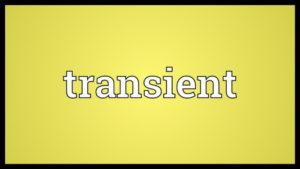Transient or ongoing: two different types of candidate experience
 For many job boards, the candidate experience is the equivalent of a ‘one night stand‘. The candidate finds – or stumbles upon – the site, looks for a job, and applies for one (or more). Then the candidate goes his or her merry way – until a future time of impending or actual unemployment, where they may or may not remember their ’employment partner’. If the job site is lucky, the candidate comes back, another brief interaction ensues, and so on. There are no long term commitments – on either side. The candidate and the job board are simply there for a specific transaction – finding a job. Once that’s over, they go their separate ways. Not an optimal candidate experience!
For many job boards, the candidate experience is the equivalent of a ‘one night stand‘. The candidate finds – or stumbles upon – the site, looks for a job, and applies for one (or more). Then the candidate goes his or her merry way – until a future time of impending or actual unemployment, where they may or may not remember their ’employment partner’. If the job site is lucky, the candidate comes back, another brief interaction ensues, and so on. There are no long term commitments – on either side. The candidate and the job board are simply there for a specific transaction – finding a job. Once that’s over, they go their separate ways. Not an optimal candidate experience!
As with ‘real life’ relationships, many in the recruiting industry find this lack of commitment unsatisfying. After all, the candidate has a life-long career. He/she will acquire more experience and skills, and thus become more valuable to each succeeding employer. That’s why recruiters have their own detailed databases of candidates – so they can reconnect with a person as they progress through their work life (and of course pick up a placement fee each time the candidate is hired!).
Some job boards also recognized the value of keeping the candidate engaged even when they weren’t looking for a job. They realized improving the candidate experience to retain candidates did several positive things for their business: a) it increased the overall size of the candidate base; b) it lowered the total cost of candidate acquisition (since you weren’t constantly reacquiring candidates you had gotten in previous years); and c) it increased the overall engagement of the candidates – which helped employers.
But how did these job boards hold on to candidates? Several candidate experience methods evolved:
- Hubs: As I’ve described elsewhere, hubs are ‘gathering places’ and information sources for people in the same industry or profession. Often the hub developed first, and then the job board was added on – although sometimes the reverse happened. Since a hub is – by definition – more than ‘just a job board’, candidates have many reasons to come back to the site, even when they aren’t looking for work. A few examples include: Archinect, for architects; Aunt Minnie, for radiologists; and Panetizen, for urban planners. I should also add that hubs offer additional revenue opportunities via ads and sponsorships apart from the job board revenue.
- Q&A: Got a question? On the internet, someone always has an answer – but a vetted, reliable location for answers tends to draw smart people, no matter what the industry or profession. LiinkedIn used Groups in this way to drive engagement (although they’ve fallen into disuse in recent years). But the best example of a Q&A site that monetizes via its job board would be StackOverflow, the Q&A site for developers. Although the Stack Q&A platform also operates in many other disciplines, its tech site is dominant. Like forums of old, Q&A sites keep candidates coming back – and engaged.
- Ratings: Just as everyone likes Q&A, most folks like to ‘rate’ things – their car, their dog, and yes, their employer. GlassDoor is of course the pioneer in this type of site – which of course monetizes via job postings – but there are also more specialized ratings sites like FairyGodBoss (focused on women) TruckersReport (focused on truckers).
- Ego: Ok, I suspect no one refers to these sites as ‘ego sites’ but me – yet why do developers submit to the many tests on HackerRank and other similar sites if not for ego? Well, ok – they also want to get a better job! But – as with the Q&A sites – people love to show off what they know. If a site can make the assessment fun and entertaining (for example, check out Pymetrics), the candidate will keep coming back – which is the name of the game, right?
So if you (or your customers) are tired of ‘transient’ candidates, think about moving in another candidate experience direction. You may be glad you did.
[Want to get Job Board Doctor posts via email? Subscribe here.]. [Check out the JobBoardGeek podcast archive!]
Comments (0)